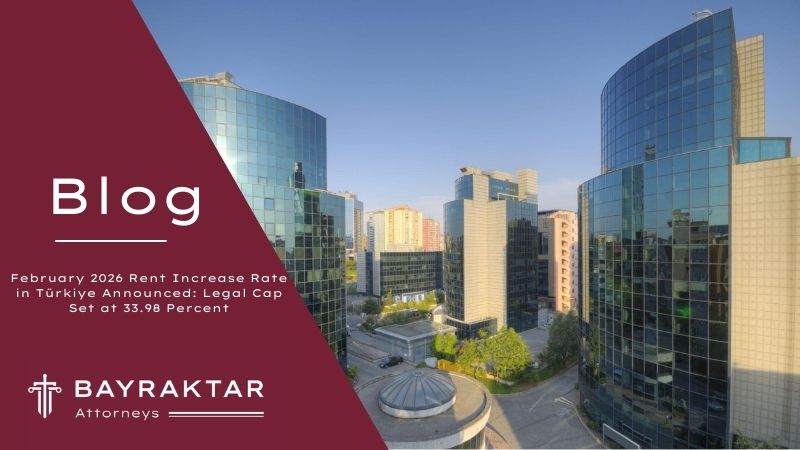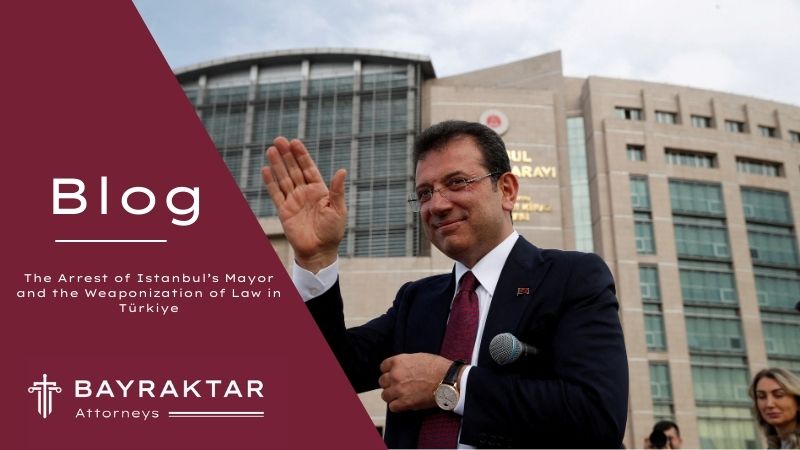![["A horizontal real-life photo showing a rental agreement document on a wooden desk with a pen, without any text or overlaid graphics."]](https://admin.bayraktarattys.com/api/admin/images/images/projects/0beee886-37ca-4777-9756-b29effea452c_a-photograph-captures-a-rental-agreement-document.jpg)
Many foreign property owners in Türkiye are unaware that Turkish law grants them a valuable right to terminate a residential or roofed workplace lease without giving any reason, after 10 years of automatic renewals. This can offer flexibility to landlords who wish to repurpose, sell, or renovate their properties after a long-term tenancy, provided the termination process follows strict legal procedures.
In this blog, we explain the legal framework behind this right, the notice requirements, court enforcement mechanisms, and the importance of accurate date calculation when exercising this right.
The Legal Basis: TBK Article 347
Under Article 347 of the Turkish Code of Obligations (TBK), lease contracts that automatically renew from year to year after their initial term can be terminated by the landlord, without providing a reason, once 10 renewal years have passed. The law applies to both:
Fixed-term lease contracts(e.g., 1-year agreements that silently renew)
Open-ended lease contractswith no definite term
However, in either case, strict notice rules and timing must be followed, or the right to terminate is postponed until the following renewal year.
What Happens When 10 Years Pass?
After the 10th renewal year, the landlord may issue a written notice of termination, as long as it is sent at least three months before the end of the current lease year.
The landlord does not have to state a reason.
The tenant does not have a legal right to object, unless procedural rules were breached.
If the tenant fails to vacate, the landlord must initiate an eviction lawsuitin civil court.
This makes the 10th-year rule one of the few mechanisms where the landlord's discretion alone is sufficient to terminate a long-standing lease.
Case Law Support: How Courts Interpret Article 347
The Court of Cassation (Yargıtay), Türkiye’s highest civil court, has consistently upheld this right in several landmark decisions. In a case involving a lease signed in 1999, Yargıtay ruled that the 10-year period began with the original lease even though it had been silently renewed annually without interruption.
In that case:
The landlord gave notice in the 14th year (after the 10-year threshold),
The tenant objected, claiming the lease was indefinite,
Yargıtay ruled the termination was valid, reinforcing that Article 347 applies to all contracts renewed annually unless expressly renegotiated.
This case law is especially important for foreign landlords seeking clarity on how Turkish courts interpret the 10-year threshold.
When Does the 10-Year Period Begin?
The 10-year count begins from the end of the original lease term, assuming the contract continues with automatic annual renewals. Importantly:
If a new lease is signed between the same parties (even with the same terms), the 10-year clock resets.
If ownership of the property changes(e.g., sale or inheritance), the lease continues, and the 10-year clock does not reset unless a new contract is signed.
Thus, from a landlord’s perspective, it is often not advisable to re-sign a new lease with the same tenant, as it removes their ability to terminate under the 10-year rule.
Notices Must Be in Writing and Served Correctly
To legally terminate a lease after 10 years, the landlord must send a written notice at least 3 months prior to the renewal date. Best practice includes:
Sending the notice via notary public (noter)
Using registered mail with return receiptif served personally
If the lease is shared by multiple tenants (e.g., husband and wife), all tenants must be notified separately
Failure to send notice within the three-month period pushes the landlord’s right to terminate to the following year, meaning the tenant gets an extra year of tenancy.
What If the Tenant Refuses to Vacate?
Even after valid notice is served, tenants may choose not to leave. In such cases:
The landlord must file an eviction lawsuit under Article 350 of TBK.
Courts will examine the existence of the contract, the passage of 10 renewal years, and compliance with notice period.
If all conditions are met, the court will grant a final eviction order, but the process may take several months.
During this time, tenants continue paying rent, and landlords should not attempt to evict by force, as self-eviction is illegal under Turkish law.
Key Considerations for Foreign Landlords
Track Lease Dates Accurately: Knowing the exact start and renewal dates of the original contract is essential.
Avoid Unnecessary Renewals: Signing a new lease can forfeit your right to terminate under the 10-year rule.
Use Legal Channels: Work with a Turkish lawyer to ensure notices are correctly drafted and served.
Consider Future Plans Early: If you plan to sell, renovate, or occupy the property personally, timing is crucial.
Tenant Protections Still Apply
While landlords can terminate after 10 years, tenants still benefit from basic protections:
The termination must follow the law—especially regarding timing and notice.
Clauses in lease agreements that attempt to remove this right from the landlord are generally invalid.
Courts will closely inspect landlord behavior to prevent abuse of rights, especially if eviction appears retaliatory.
Real-Life Example: International Client Assistance
At Bayraktar Attorneys, we recently assisted a foreign client who purchased a residential unit in İstanbul that had been rented out for more than 12 years. Although the tenant was resistant to vacate, we:
Verified the lease start and renewal dates,
Drafted and served a notarized termination notice,
Filed an eviction lawsuit after the tenant refused to leave,
And successfully obtained a court-ordered eviction.
This illustrates how legal strategy, procedural compliance, and professional representation are essential for asserting landlord rights in Türkiye.
Conclusion: The 10-Year Rule Is a Strategic Asset
Understanding Article 347 of the Turkish Code of Obligations gives landlords a powerful tool, the ability to end a lease without justification after 10 years of renewal. But like all legal tools, it must be used correctly, and timing is everything.
Whether you're a landlord preparing to reclaim your property or a tenant seeking to understand your rights, Bayraktar Attorneys can help guide you through every legal step.







